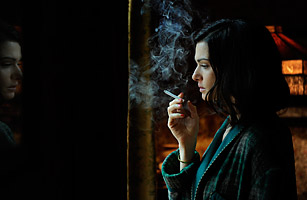
To the English upper class in the post–World War II years, the notion of smoldering eroticism was so veddy ... European. "Let's not be vulgar, Hester," the right-too-honourable judge Sir William Collyer (Simon Russell Beale) tells his wife (Rachel Weisz). "We are talking about marriage." William's imperious mother, who sneers at an afternoon meal with Hester as though it's tea and strumpets, also believes that passion is ugly. She prefers "a guarded enthusiasm. So much safer." But Hester, the volcanic heroine of Terence Rattigan's 1952 play, is too besotted for safety or for the frosty security of her husband's embrace. She's fallen for Freddy Page (Tom Hiddleston), once a Royal Air Force pilot, now a wastrel who knows how to kiss. That's all Hester wants after she leaves William for Freddy — even after her beau loses interest in his titled mistress.
Hester's violent emotions collide not just with postwar English reserve but with Rattigan's reputation as a playwright. He was the bard of the well behaved; in Hester he created a woman whose sexual ferocity could crack the china in any tea set. Peggy Ashcroft, Margaret Sullavan, Vivien Leigh and Blythe Danner have taken the role of this midcentury tragic heroine, to whom Weisz imparts intellectual acuity and, as Hester descends into depression, a saintly, forlorn fury. She finds the perfect director in Terence Davies, whose wonderful pair of autobiographical features Distant Voices, Still Lives in 1988 and The Long Day Closes in 1992 were based on memories of his working-class Liverpool family. This time, though the financial and social statuses are higher, the tensions are just as wounding.
Unlike David Mamet's 1999 version of Rattigan's The Winslow Boy — an impersonal rendition of the plot, designed to show that a tough-guy auteur could play efficiently in a milder minor key — Davies' Deep Blue Sea is as much his vision as the playwright's. As in his early films, popular music strikes sparks of solidarity: when a crowd in a bar sings "You Belong to Me" and when, in a long tracking shot down the Aldwych underground platform during the war, a rendition of "Molly Malone" unites every stratum of London society. In Hester and Freddy's big love scene, Samuel Barber's Opus for Violin and Orchestra saws majestically away as the nude lovers twine in geometric ecstasy. The film's images hold their own visual symphony: the subtle decor reveals as many shades of brown — in the mahogany furniture, the gentlemen's suits, the fringed lamp shades — as there are shades of green in an Henri Rousseau jungle landscape. The movie is a museum of emotions, brought to contemporary life through Davies' artistry and Weisz's fire. Here, they show us, is how people felt, and hurt, in another time. Their love and pain can touch us today.